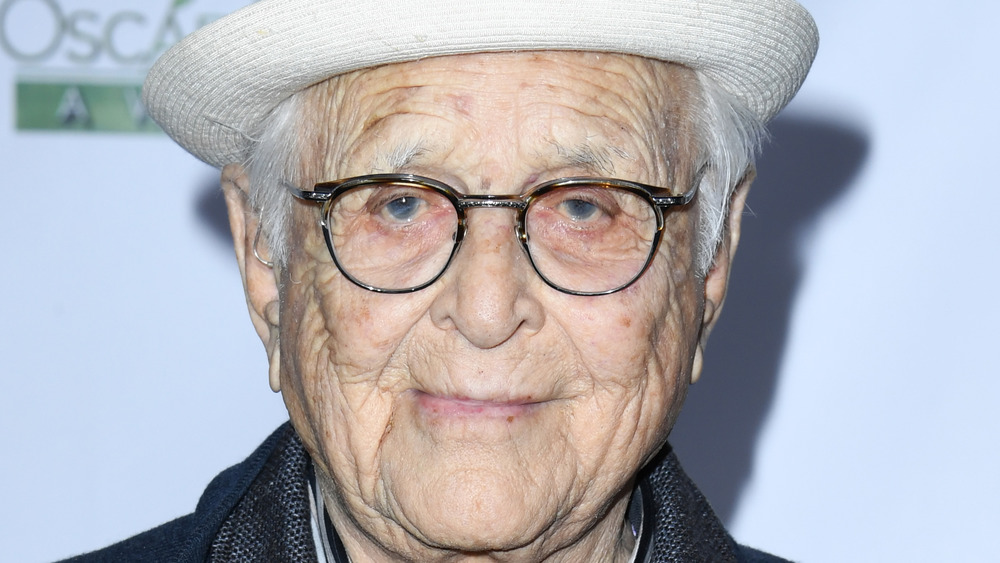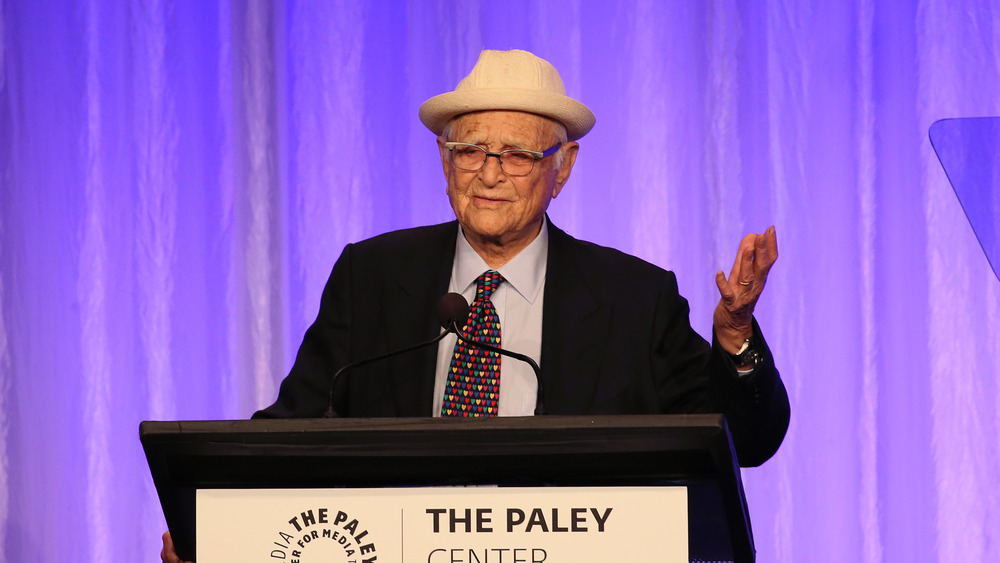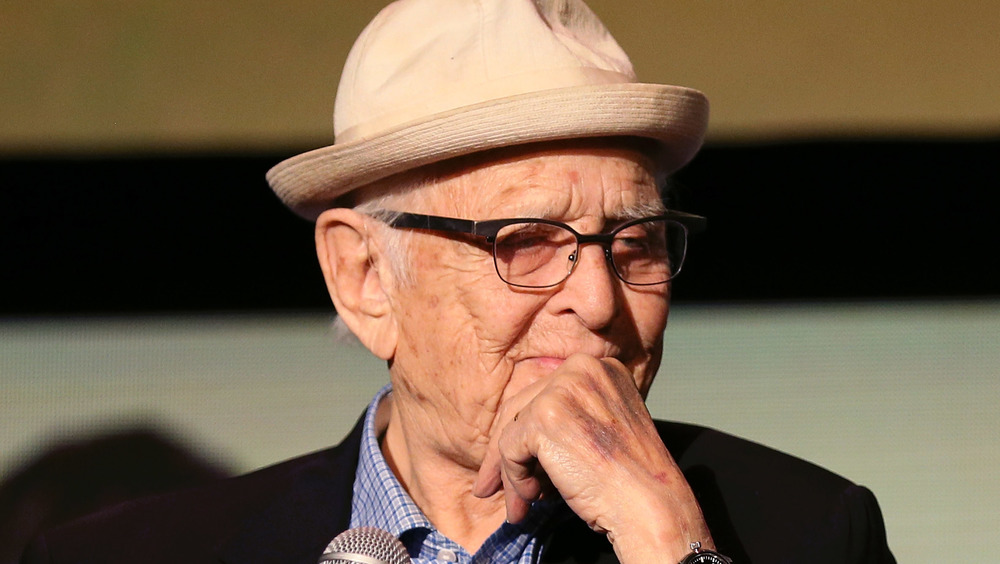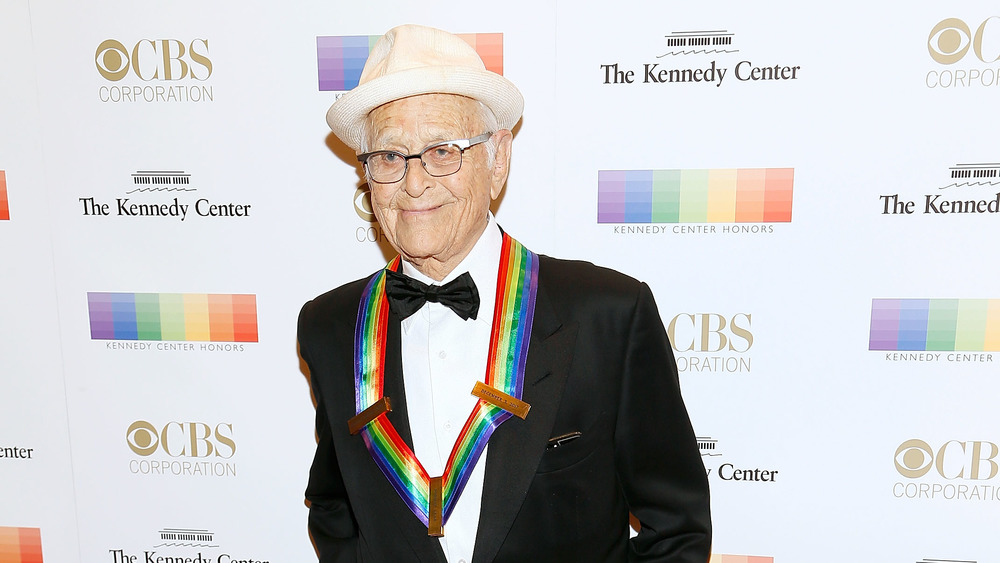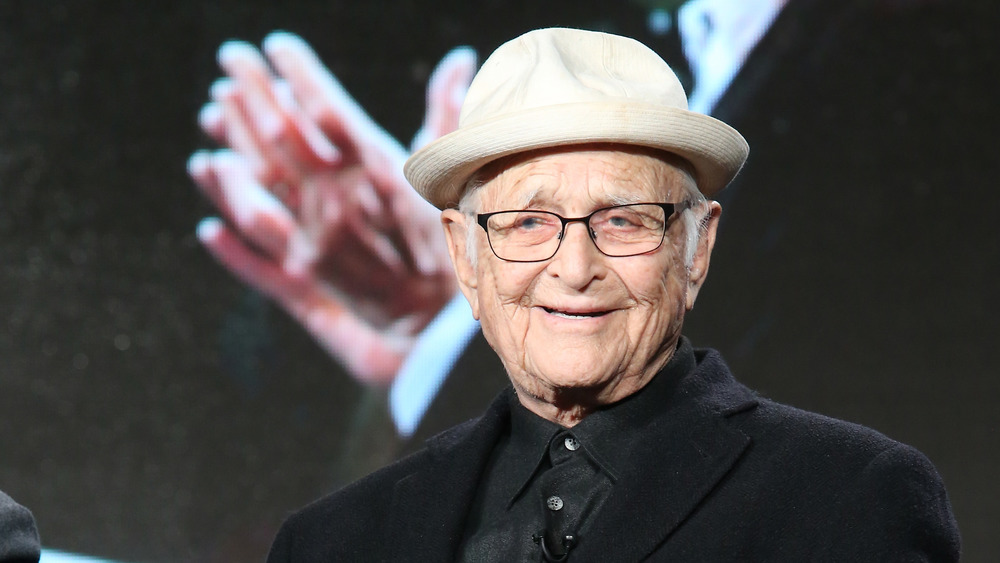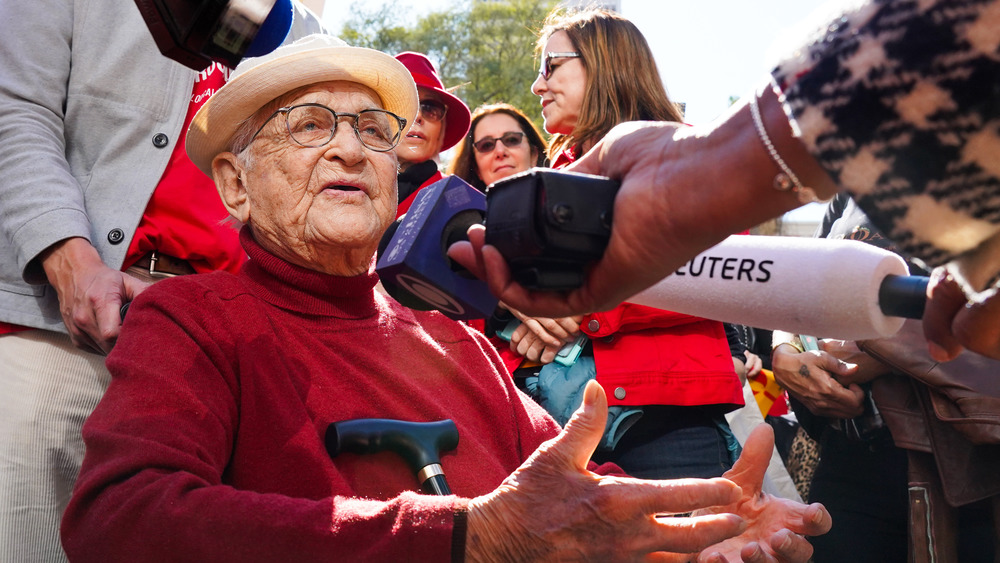What You Don't Know About Norman Lear
GQ called writer and producer Norman Lear "The Comedy Godfather of Television." It's more than likely, if you've watched any TV over the last six decades, that you've laughed at something Lear has written or produced. His dedication to sitcoms and political work has made him one of the "most influential people in TV history", Business Insider reports. But here's what you don't know about Norman Lear. His work gained him fans in the White House and across America. However, that's not to say that he didn't ruffle a few feathers in the process.
According to CNN, while the likes of All My Family, Sanford and Son, and The Jeffersons may seem like just funny sitcoms now, they were some of the first of their kind and considered "groundbreaking." In an interview with Lear in 2021, CBS revealed that he's still working at 98-years-old. Speaking about his debut work, All In The Family, which aired in 1971, Lear said, "To be able to laugh in a rehearsal at something you hadn't expected, and then to stand to the side or behind an audience laughing, and watch them, their bodies — a couple of hundred people as one — when something makes them laugh, I don't think I've ever seen a more spiritual moment than an audience in a belly laugh."
Lear has been in show business for six decades, behind-the-scenes, writing and producing laughs. But here are some of the things you may not know about him.
Norman Lear "held up a mirror to American society and changed the way we look at it" & had nine series running at once
CNN reported that Lear got his big break in TV when All My Family was picked up by CBS. AARP explains that the series ran for nine seasons and talked about religion, sexuality, and racism, which were left off the screen at the time. Its lead character, Archie Bunker (played by Carroll O'Connor) became a star in the show. However, over the course of the show, Lear also produced and ran Sanford and Son, Maude, Good Times, The Jeffersons, One Day At A Time, Mary Hartman, Mary Hartman, Fernwood 2 Night, and America 2-Night. The '70s were a busy time for Lear.
However, GQ explains that due to the topics covered in his shows, Lear was heralded as a forward thinker and brave voice. Lear told Vox that he didn't see it that way. "We're not talking about anything that isn't a topic in the average American household. Whether it's cancer or a child that's considering sex if the family is lucky enough to have the child talking about it at home, there was nothing new about any of this," he said. "What was new was what that the media hadn't touched it. The roast is ruined, and the boss is coming to dinner was the kind of problem [TV sitcoms] concerned themselves with, as opposed to what was happening in their families every day of their lives."
His work gained him fans within the White House. The Kennedy Center reported that in 1999, President Clinton awarded the National Medal of Arts to Lear and said he had "held up a mirror to American society and changed the way we look at it."
Norman Lear was on Richard Nixon's "Enemies List"
RobertEbert.com published an enlightening extract of Lear's autobiography, Norman Lear: Even This I Get to Experience. It read, "In my 90-plus years I've lived a multitude of lives. In the course of all these lives, I had a front-row seat at the birth of television; wrote, produced, created, or developed more than a hundred shows; had nine on the air at the same time; founded the 300,000-member liberal advocacy group People for the American Way; was labeled the 'No. 1 enemy of the American family' by Jerry Falwell; made it onto Richard Nixon's 'Enemies List'; was presented with the National Medal of the Arts by President Clinton."
Lear's advocacy work both on- and off-screen gained him some negative attention. However, the documentary Norman Lear: Just Another Version of You explores how his fearless approach to topics such as war, poverty, racism, and equal rights busted stigma on-screen, but also secured him a place on Nixon's "Enemies List."
Business Insider explains that Nixon's "Enemies List" or the "Opponents List" was released in 1973 and was made up of journalists, business people, politicians, and entertainers who were considered to be top enemies to President Nixon.
Norman Lear was a pioneer for disability on screen
Lear told IndieWire that showcasing mental and physical disability on-screen was part of his work of showcasing American life as it is in reality. "I grew up in Hartford, Connecticut. And across the street from me there was a disabled person, up the street from me there was somebody with a different disability. It wasn't unknown to me," he told the publication.
IndieWire highlights that in Good Times, Lear discusses dating as a wheelchair user. He also cast a number of disabled actors like Melanie Watson and Geri Jewell in his sitcoms. Speaking to Jewell for Ability Magazine, he said, "I think I learned early that it's hard to be a human being. I don't care what the circumstances of one's birth, it's hard. If life hasn't made mischief for us, we'll make it for ourselves. But that's the game of life. We pay a lot of money for these fancy games of all kinds. It requires us to compete and engage and beat that game or this game. And the game of life we don't think of that way, and perhaps we should. It's tough."
Norman Lear toured the country with an $8.1 million copy of the Declaration of Independence
GQ outlines that Lear has been a proud supporter of First Amendment rights. He called himself a liberal, and CNN said he's "well-known to be a political activist." Speaking to The Hollywood Reporter, Lear said, "Comedy reflects the feelings, opinions, whatever issues from the person writing the joke or creating the situation. In our work, we're dealing with feelings. The writing reflects those feelings. I guess those feelings reflect politically, too."
CBS reported that in 2000, Lear and a partner bought a 1776 copy of the Declaration of Independence for $8.14 million. GQ said that Lear took it on a roadshow to all 50 States, to remind America what it stood for. He told the publication, "We desperately need a father in the White House. FDR, who had these fireside chats where he was talking to us, that felt like a father in the White House, not a parent but a teacher, to help us talk about the things that matter."
Norman Lear wanted to produce a spiritual talk show with friend, Maya Angelou
Lear's career has been seriously varied, and CBS revealed that, at 98, he's still pitched new shows to networks. The broadcaster spoke to Lyn Davis Lear, Lear's partner, about whether he'd spoken about slowing down. She told them, "Oh God, yes. But that's just not possible. He's not the retiring type. He loves that office and he's got, what? Six shows possibly coming up? I mean, it's crazy."
CNN reported that he consulted on South Park and produced a voice for Benjamin Franklin. He also told GQ, "I wanted to do a Sunday-morning service, a service with great music and great talking about nobody's God per se, everybody's God." He also said he'd talked about producing a spiritual talk show with Maya Angelou before she passed away and wanted to produce a show called Religion, starring Richard Pryor and Robin Williams as two motorcycle policemen. It'd seem that he's still got a ton of sitcom ideas.
